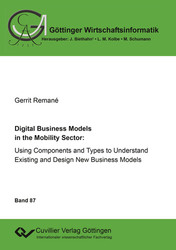| Fachbereiche | |
|---|---|
| Buchreihen (96) |
1381
|
| Nachhaltigkeit |
3
|
| Gesundheitswesen |
1
|
| Geisteswissenschaften |
2370
|
| Medienwissenschaften | 16 |
| Theologie | 57 |
| Philosophie | 102 |
| Rechtswissenschaft | 424 |
| Wirtschaftswissenschaften | 851 |
| Sozialwissenschaften | 418 |
| Sportwissenschaften | 48 |
| Psychologie | 233 |
| Pädagogik | 190 |
| Geschichtswissenschaften | 183 |
| Kunstwissenschaften | 111 |
| Kulturwissenschaften | 166 |
| Literaturwissenschaften | 117 |
| Sprachwissenschaften | 88 |
| Naturwissenschaften |
5408
|
| Ingenieurwissenschaften |
1795
|
| Allgemein |
98
|
|
Leitlinien Unfallchirurgie
5. Auflage bestellen |
|
Erweiterte Suche
Digital Business Models in the Mobility Sector (Band 87)
Using Components and Types to Understand Existing and Design New Business Models
Gerrit Remané (Autor)Vorschau
Inhaltsverzeichnis, PDF (96 KB)
Leseprobe, PDF (420 KB)
Recent advances in digital technologies have initiated a fundamental digital
transformation of the mobility sector. This shift means that managers must understand new
digital business models such as carsharing, ridesharing, and crowd navigation. For research,
the digital transformation of the mobility sector is an especially interesting phenomenon, as it
is different from transformations in other sectors in the way that digital technologies must be
combined with physical products. This thesis turns to the business model concept to increase
the understanding of the above described phenomenon by investigating three research
questions: (1) Along which business model components do existing products and services in
the mobility sector differ? (2) What new types of digital business models have emerged in the
mobility sector? (3) How can firms use business model components and business model
types for business model innovation?
| ISBN-13 (Printausgabe) | 9783736995444 |
| ISBN-13 (E-Book) | 9783736985445 |
| Buchendformat | A5 |
| Sprache | Englisch |
| Seitenanzahl | 230 |
| Auflage | 1. |
| Buchreihe | Göttinger Wirtschaftsinformatik |
| Band | 87 |
| Erscheinungsort | Göttingen |
| Promotionsort | Göttingen |
| Erscheinungsdatum | 02.06.2017 |
| Allgemeine Einordnung | Dissertation |
| Fachbereiche |
Wirtschaftswissenschaften
Betriebswirtschaftslehre Informatik |
| Schlagwörter | Digital, Business, Mobility Sector |








